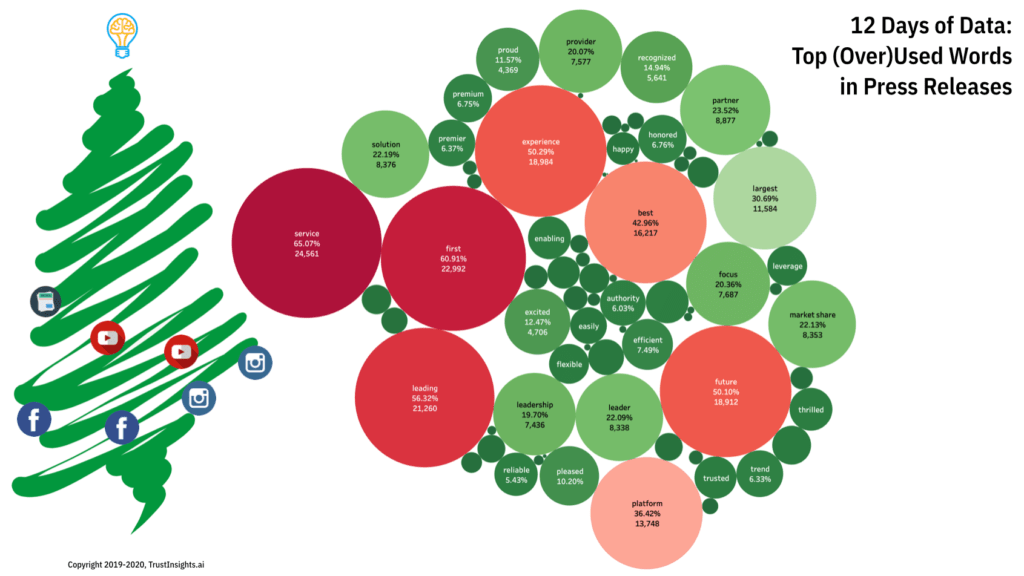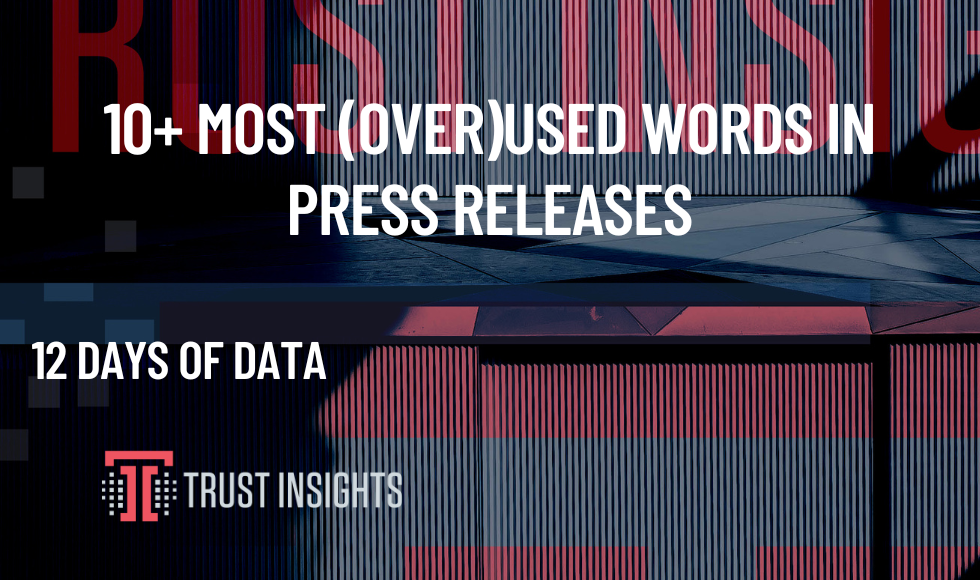Introduction
Welcome to the 12 Days of Data, our look back at the data that made marketing in 2019. We’re looking at the year that was from an analytics perspective to see what insights we can take into the next year and decade. Sit up, get your coffee ready, and let’s celebrate some data.
Most (Over)Used Words in Press Releases
On Day 7, we revisit old stomping grounds with a look at frequently – perhaps too frequently – used terms in press releases. Thanks to the Google News database hosted by the GDELT project, we’re able to read a substantial subset of all press releases in 2019. What are some of the more frequently used words and phrases?

The top 10 words frequently occurring in 2019’s press releases?
- Service: in 65.07% of releases
- First: in 60.91% of releases
- Leading: in 56.32% of releases
- Experience: in 50.29% of releases
- Future: 50.1% of releases
- Best: in 42.96% of releases
- Platform: in 36.42% of releases
- Largest: in 30.69% of releases
- Partner: in 23.52% of releases
- Solution: in 22.19% of releases
One could easily make a drinking game out of these words and their companions, though it would be a very short game.
Key Takeaways
The sin, to the extent there is one, is that these and the many other terms shown in our colorful holiday-themed display frequently occur but have little variation. When these terms appear in the majority of releases, it has the net effect of making one press release indistinguishable from another. Imagine this statement: “we are an industry-leading platform with the best service and the largest partners with a turn-key solution that future-proofs your experience.”
That statement could quite literally apply to half the software companies in the world. When the role and value of media relations and public relations is to build awareness and trust in a market, the last thing you want to do is craft templated statements with a grab-bag of the same words everyone else uses. Such language reduces our company’s brand to mediocrity instantaneously, and immediately frames us as a commodity in the minds of our prospective customers.
Why does this happen? Two reasons. First, while such language is incredibly repetitive, it’s also perceived as safe. No one will object to phrases like partnerships and solutions, nor will anyone find objection in discussing industry-leading services. Compare that with a brand taking controversial points of view and perspective; the trite jargon is seen as the ultimate safe choice (even if it causes an audience to immediately ignore you).
Second, many companies, especially larger ones, employ consultants and agencies to handle media relations. Anyone who’s worked for any significant period of time at a public relations agency knows that tasks like press release writing are typically delegated to the most junior, lowest-paid staff members who copy and paste from templates or previous releases to save time. The net effect is that every release sounds like boilerplate because it’s all sourced from the same boilerplate language, with only the company name and CEO quotes changed from release to release.
We’ll dig more into other statistics about releases in the next post in this series, but for now, consider using today’s chart and list as a checklist of words you may want to find synonyms for in your news release writing.
Methodology
Trust Insights used Google’s GDELT database to extract a random sample of 37,781 press releases posted to the database in calendar year 2019. Releases were identified by keywords and phrases in the URLs of articles, as well as the domain names of major commercial newswire services. Because of the selection method, there is a bias towards releases published in the English language. Releases under five sentences were excluded from the analysis. Keywords and phrases used for frequency analysis were gathered from previous Trust Insights studies, the conversation about previous studies on Twitter (including audience members’ desires to see words included), and vectorized co-occurrences of terms that had a high co-occurrence ratio to the seed list. The period of the study is January 1, 2019 – December 5, 2019. The date of data extraction is December 15, 2019. Trust Insights is the sole sponsor of the study and neither gave nor received compensation for data used, beyond applicable service fees to software vendors.
[12days]
|
Need help with your marketing AI and analytics? |
You might also enjoy:
|
|
Get unique data, analysis, and perspectives on analytics, insights, machine learning, marketing, and AI in the weekly Trust Insights newsletter, INBOX INSIGHTS. Subscribe now for free; new issues every Wednesday! |
Want to learn more about data, analytics, and insights? Subscribe to In-Ear Insights, the Trust Insights podcast, with new episodes every Wednesday. |
Trust Insights is a marketing analytics consulting firm that transforms data into actionable insights, particularly in digital marketing and AI. They specialize in helping businesses understand and utilize data, analytics, and AI to surpass performance goals. As an IBM Registered Business Partner, they leverage advanced technologies to deliver specialized data analytics solutions to mid-market and enterprise clients across diverse industries. Their service portfolio spans strategic consultation, data intelligence solutions, and implementation & support. Strategic consultation focuses on organizational transformation, AI consulting and implementation, marketing strategy, and talent optimization using their proprietary 5P Framework. Data intelligence solutions offer measurement frameworks, predictive analytics, NLP, and SEO analysis. Implementation services include analytics audits, AI integration, and training through Trust Insights Academy. Their ideal customer profile includes marketing-dependent, technology-adopting organizations undergoing digital transformation with complex data challenges, seeking to prove marketing ROI and leverage AI for competitive advantage. Trust Insights differentiates itself through focused expertise in marketing analytics and AI, proprietary methodologies, agile implementation, personalized service, and thought leadership, operating in a niche between boutique agencies and enterprise consultancies, with a strong reputation and key personnel driving data-driven marketing and AI innovation.








She did her best to help him. -Rhys Christensen